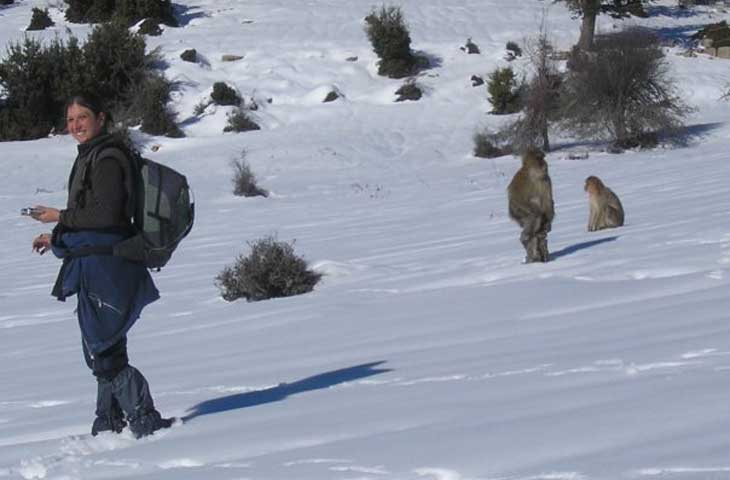Roehampton Alumna advises tourists to not feed wild monkeys
- Thursday, June 2, 2016
Feeding monkeys is a popular tourist activity in Morocco where the endangered species, Barbary macaques live and whilst it may seem generous, it is a risk factor to their health according to new research.

Roehampton alumna, Dr Laëtitia Maréchal from the Department of Life Sciences led a study as a part of her PhD on primate tourism in Morocco which started in 2011. Including a team of scientists Professor Stuart Semple and Professor Ann MacLarnon from the University of Roehampton and Dr Bonaventura Majolo from the University of Lincoln, the study found that feeding monkeys resulted in the monkey’s having larger body sizes and being more susceptible to disease and stress.
They studied two groups of Barbary macaques at closely located sites in Ifrane National Park, in the Middle Atlas Mountains of Morocco. At the first site, where tourists have visited for over ten years, the Barbary macaques received 44.6% of their daily food intake from humans. At the second study site, another group of Barbary macaques that rarely encountered tourists relied solely on natural food resources.
Macaques that ate food from tourists were found to have more hair loss and also overall suffered from higher levels of stress hormones. Also, not all females in this group gave birth in comparison to the natural food resources group in which all females gave birth.
Dr Maréchal said: “Primate tourism was proposed as a potential tool for the conservation of these endangered macaques, however common practice is for tourists to feed wild macaques which is proven to be harmful for their welfare. Measures need to be taken for regulation and we are hopeful that changes will be made by the Moroccan authorities and the local community soon to ensure that tourists are not feeding the macaques. It is crucial that tourists are informed to ensure the macaques survival.”
Read more about the findings of the study in the journal article entitled Assessing the Effects of Tourist Provisioning on the Health of Wild Barbary Macaques in Morocco.
The Department of Life Sciences at Roehampton offers a range of outstanding degrees including the integrated BSc and MSc Zoology and BSc in Zoology. Students may also further their studies the MRes Primate Biology, Behaviour and Conservation course.
